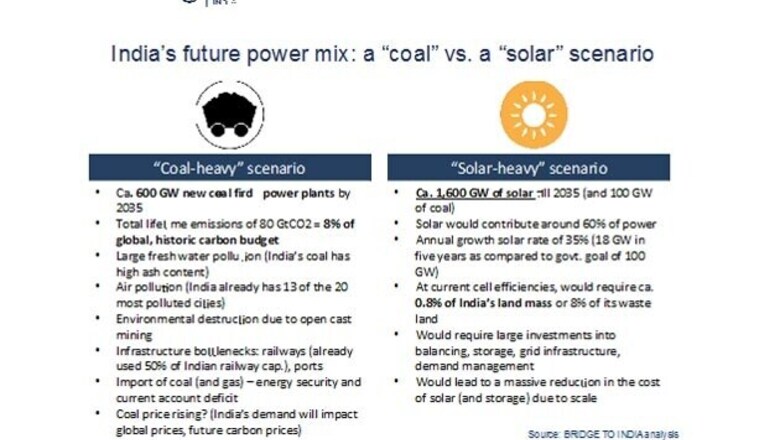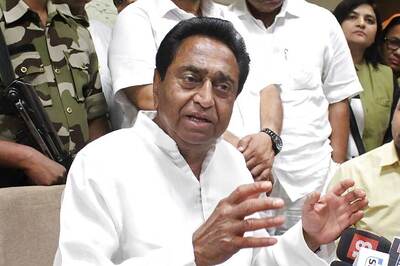
views
India's electricity supply in order to match the country's development ambitions (high growth of 8%+ p.a. with industrialization, better quality of power, better energy access) would have to grow by around 7% every year. Then the country would need to grow from 1,050 TWh in 2012 to almost 5,000 TWh in 2035. The next question is, of course, what could be the energy mix to reach that number? How much of it will be fossil fuels? How much will be renewables?
- Under a business-as usual scenario, India would build around 500 GW of coal fired power plants
- Under a "Solar" scenario, India could build more than 1,600 GW of solar to meet around 60% of its power requirements (and would still build almost 100 GW of coal)
- Both options come with vast challenges
Let us assume solar in India grows at 20% per annum for the next five years. That sounds significant, but in fact will not be enough to really change the country's energy trajectory. From the current 4 GW, it would reach 153 GW by 2035 and provide around 6% to India's energy demand. The lion's share would come from coal, which would grow from the current 156 GW to 677 GW (an addition of 521 GW).
Is that even possible? Although India has large domestic coal reserves, it is likely that higher quality import coal would also be used, requiring investments into port infrastructure. Today, half of India's railway infrastructure and capacity is already used for transporting coal. This would need to be ramped up enormously. It is important to remember that even today, large infrastructural bottlenecks are a major headache for the coal industry. The result of such a coal build-up will be air pollution (can be partially mitigated with air filters), large-scale soil degradation and pollution of enormous quantities of water (especially from chemical "washing" of coal). In addition, unless there is a credible and affordable carbon capture and storage program, CO2 emissions will be immense. The higher the share of import coal, the more India's energy security and current account balance will suffer. The cost of coal, both in India and globally, would likely be driven up by so much additional demand, making coal more expensive.
Solar, on the other hand, would be a different story. At an annual growth rate of 35%, India could have more than 1,600 GW of solar by 2035. This could supply 58% of the power. (Coal might still have to be increased almost 100 GW to bring the total to 250 GW.)
Could that be done? 1,600 GW would - at current efficiency levels - require just under 1% of India's land mass. As efficiencies are continuously increasing, this number will fall. Solar is today still relatively expensive at around Rs. 6.5 per kWh (utility scale) to Rs. 8 per kWh (rooftop) and storing it adds around 50% to the cost. However, these numbers are quite irrelevant, if India were to indeed build 1,600 GW of solar - around four times the total global installed capacity today. Then, costs would come down very rapidly to perhaps a fourth or a fifth of the current levels. The great thing about renewables is that they are a technology and not a fuel. They are unlimited and the more they are deployed the cheaper they get. While the more we use limited fossil fuels, the more expensive they become.
It will not be easy to do. There are issues around storage and grid stability that need to be addressed. There will have to be intelligent demand management, good forecasting, some balancing and spinning reserves - essentially a "smart grid". But India will build a domestic energy economy, will protect its air, water and soil (and the global climate) and ensure that it becomes an exporter of know-how rather than an importer of fuels.
(Dr. Tobias Englemeier is the Founder & Director of BRIDGE TO INDIA)



















Comments
0 comment